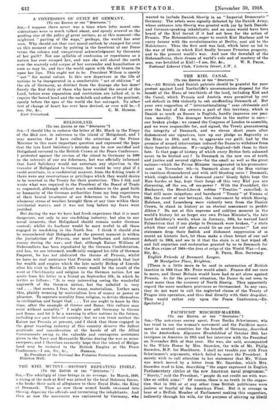HELIGOLAND.
ITO THE EDITOR OF THE " SPECTATOR."]
SIR,-I should like to endorse the letter of Mr. Black in the Times of the 23rd inst. in reference to the island of Heligoland, and I may mention that I have called the attention of the Prime Minister to this most important question and expressed the hope that the late Lord Salisbury's mistake may be now rectified and Heligoland restored to the British Crown at the Peace Conference. I protested against the cession of the island to Germany in 1890 in the interests of our sea fishermen, but was officially informed that Lord Salisbury would not entertain any objection to the transfer of Heligoland to Germany, but would be very glad if I could ascertain, in a confidential manner, from the fishing trade if there were any reservations or privileges which they would desire to be inserted in the Treaty for their protection. This I did, and wrote what was required to the President of the Board of Trade as requested, although without much confidence in the good faith or humanity of the German authorities from my long experience of their brutal treatment of our fishermen in the North Sea whenever stress of weather brought them at any time within their territorial waters, and it was not long before my fears were j notified.
But during the war we have had fresh experience that it is most dangerous, not only to our sea-fishing industry, but also to our naval interests, that Heligoland should remain under German control; whilst its harbour would be most useful to all those engaged in sea-fishing in the North Sea. I think it should also be remembered that Heligoland at the present moment is within the jurisdiction of Prussia, our most barbarian and inhuman enemy during the war; and that, although Kaiser William of Hohenzollern has been repudiated by the German Confederation, and has, we are informed, unofficially resigned his title of German Emperor, he has not abdicated the throne of Prussia, whilst we have no real assurance that Prussia will relinquish that lust for wealth and empire which the late saintly Bishop of Lincoln after his visit to Berlin in 1875 wrote would be the result of the want of Christianity and religion in the German nation. Let me quote from his letter to a friend on September 5th, in which he writes as follows: "It is very interesting seeing the wonderful upgrowth of the German nation, but the unbelief is very sad . . . that means, I fear, for many, materialism. Luther says this, plainly meaning by materialism love of money or power or pleasure. To separate morality from religion, to devote themselves to civilization and forget God. . . . Yet one ought to know by this time, after the example of Greece and Rome, this culture may exist without morality." I might now add Germany to Greece and Rome, and let it be a warning to other nations in the future, including our own beloved country; but we can trust neither the Kaiser nor Prussia at present, and I think that those engaged in the great trawling industry of this country deserve the fullest gratitude and consideration at the hands of all the Allied Governments owing to the valuable and courageous assistance given to the Navy and Mercantile Marine during the war as mine- sweepers; and I therefore earnestly hope that the island of Heligo- land may be restored to the British Empire at the Peace
Conference.—I am, Sir, &c., HENEAGE,
Er-President of the National Sea Fisheries Protection Association. Hainfon Hall.










































 Previous page
Previous page